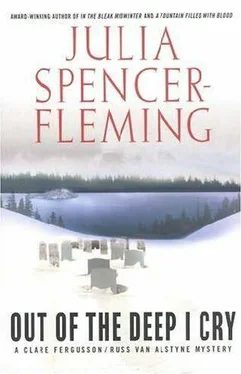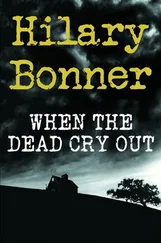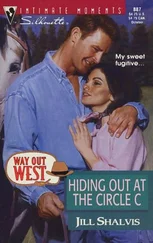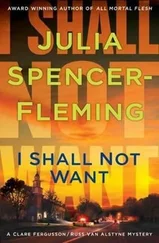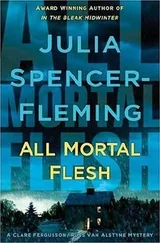“And you were one of the rich kids in town,” Mrs. Marshall said. “Milk?” She passed him the pitcher.
“I guess I was, at that.” He poured a generous amount into his coffee. “The point is, when I had to give something up, it hurt. And when I got something, I really appreciated it. Every one of my toys fit into a box the size of a small suitcase when I was a boy. You should see my great-grandchildren’s rooms. They look like FAO Schwarz.”
“Milk?” Mrs. Marshall asked Clare.
“No thanks,” she said, reaching for the sugar bowl. She looked across the table to Mrs. Marshall, who was pouring her own cup. “It’s funny you should have been talking about your childhoods, because I have a question for you. If you don’t mind.”
“What is it?”
It felt wrong to start by firing a salvo into a sensitive subject, so Clare said, “I’m doing some counseling work with a woman who has doubts about vaccinating her youngest child. I wanted a better feel for what might go into that decision, and I was hoping, I wondered…”
“Whether I could tell you more about my parents’ decision?” Mrs. Marshall said.
“I’ll understand if you don’t want to talk about it.”
“I just don’t know if I have any useful information. My grandma Ketchem told me back then, they didn’t get children immunized ahead of time. If you fell sick, you’d get the serum. You have to remember, it was brand-new. Antidiphtheria serum wasn’t even available in this country when my brother Peter and sister Lucy were born.”
“People were slower to run to the doctor then, I think,” Mr. Madsen said. “Nowadays, we’re at the doctor’s office every time we feel a twinge. Back in those days, you had to be some hurting for your parents to get the doctor out to the house.”
“That’s true,” Mrs. Marshall said. “I hadn’t really thought about that. There was no telephone out at the old farm. No electricity. My parents didn’t own a car until 1929.” My father would have had to drive his buggy into town and find Still-man any time they needed any medical treatment.”
Clare lowered her coffee cup. “I just met a Dr. Stillman at the Washington County Hospital. He said he was the third generation of his family to practice medicine here in Millers Kill. He’s an orthopedic surgeon.”
Mr. Madsen snorted. “Well, the old Dr. Stillman was a country doctor. Which meant he did everything from setting bones to delivering babies to performing surgery-”
“-on kitchen tables. With the patients’ butter knives.” Mrs. Marshall arched an almost invisible eyebrow at her old friend. “You think everything was better back then.”
“Maybe the old Dr. Stillman didn’t push the vaccine back then,” Clare said. “Since it was so new.”
Mrs. Marshall tilted her head for a moment. “No, I don’t think that was the case. As I remember him, Dr. Stillman was always after you with a needle.”
“You were immunized?”
Mrs. Marshall smiled a humorless smile. “Against everything.”
“Me, too,” Mr. Madsen said, apparently oblivious of the expression on his hostess’s face. “I think you’re right. I think he was a bug about inoculations. No pun intended.”
“Would your parents have gone to Dr. Stillman for their other children?”
“I suppose so,” Mrs. Marshall said.
“Dr. Rouse was your mother’s physician in her last years, right?”
Mrs. Marshall smiled wryly. “Allan Rouse was my mother’s physician from the moment he proposed serving in the clinic in exchange for the money for his medical degree. Not that he treated her. That didn’t come about until she was in her seventies. But he was hers. As much her creation as the clinic itself.”
“Do you know if she ever spoke to him about what happened to your older brothers and sisters?”
“I don’t know.” Mrs. Marshall sipped her coffee. “She so rarely spoke of anything to do with those times. If it weren’t for my own memories of the farm and my father, I might believe that my life started at age six, in the little house on Ferry Street.” She replaced the cup precisely on its saucer. She left a faint imprint of today’s lipstick on the rim. Scarlet. “I must have been a poor substitute for what she had lost, one child instead of four. And, of course, I was alive, and so could make mistakes and speak rudely and come home with disappointing grades and smoke cigarettes behind the garage. It must have been too painful to compare me to those perfect, dead children.”
“Perfect?” Clare said.
“Haven’t you noticed? Every dead thing is perfect.” She glanced at Mr. Madsen, who was gawking at her over the rim of his cup. “Like Norm’s yesterdays. Unchangeable, and so unable to disillusion you.”
Clare looked into her coffee. “Have you considered that maybe your mother didn’t bring up your brothers and sisters because she didn’t want you to feel as if you had to live their lives for them?”
“What do you mean?”
“It’s easy, when you’re the surviving child, to feel as if you have to carry all the expectations your parents had for your dead sibling.” She was speaking from raw personal experience at this point, with knowledge gained from countless conversations when her mother would sigh over her sister Grace’s name or point out when friends’ daughters joined Junior League or got married or had babies. All the things Grace was supposed to have done. “Maybe your mother wanted you to know that she loved you for who you were, complete. That you didn’t have to try to be Peter or Jack or Lucy or Mary. That they were her past, but you were her future.”
“You know, she may have something there.” Norm Madsen reached across the corner of the table and patted Mrs. Marshall’s delicate arm. “That would certainly jibe with the name she gave you.”
Clare raised her eyebrows. “Your name?”
Mrs. Marshall smiled, the first wholehearted smile she had given Clare since they began their conversation. “You don’t know my Christian name, do you?”
“I’ve heard Mr. Madsen and Sterling Sumner call you Lacey.”
“That’s my nickname. My pet name, I suppose you’d call it.” Her smile wisped away into something softer and sadder. “I don’t think there’s anyone left alive who calls me by my real name.”
Clare opened her hands in question.
“Solace. That’s what my mother named me. Her Solace.”
NOW
Monday, March 27
Russ came out of the handicapped elevator to thunderous applause. “Elvis is in the building, repeat, Elvis is in the building,” Deputy Chief Lyle MacAuley megaphoned the announcement with his hands.
“Yeah, thanks, I missed you all, too,” Russ said, swinging forward on his crutches. “Now stuff it.”
“I bet Linda forced him to come back to work,” Lyle said. “One week of him stuck at home and she threw his ass out of there. You can tell he’s a bad patient.”
“All men are bad patients.” Harlene Lendrum adjusted her headset over her springy gray curls. “You should see my husband Harold. What a whiner. The last time he got the flu, I told him I was sending him to the Quality Inn out on the Northway. I was perfectly willing to pay so long as it meant someone else fluffing his pillows and fetching him room service.”
“Welcome back, Chief!” Kevin Flynn had gotten a regulation haircut while Russ had been on sick leave. Now the kid looked even more like Opie from The Andy Griffith Show. How was he going to do credible traffic stops when he didn’t look old enough to have a learner’s permit? Clearly, a week away was too long.
Russ thumped up the corridor toward the squad room, an overblown, big-city name for the station’s central work area. “How ’bout you guys show me what you’ve gotten done on the Rouse case while I’ve been at home making life difficult for my wife?”
Читать дальше
